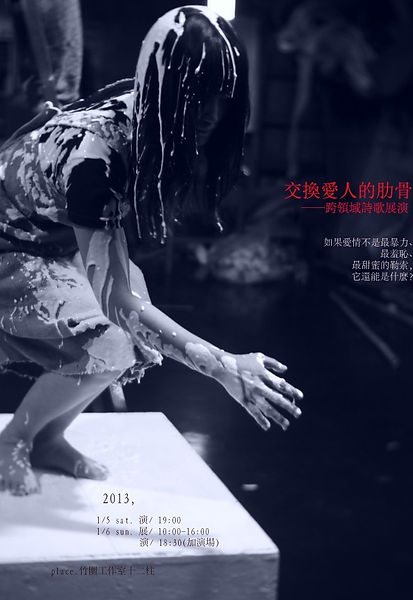
Exchanging Lover’s Ribs
Author: Yu-Hsuan Wu
Publisher: comma BOOKS
Publication Year: 2012
Language: Chinese
Pages: 176
ISBN: 978-986-88672-2-2
【About the Book】
American poet Emily Dickinson once wrote: “If I read a book and it makes my whole body so cold no fire can ever warm me, I know that is poetry. If I feel physically as if the top of my head were taken off, I know that is poetry. These are the only ways I know it. Is there any other way?”
Yu-Hsuan Wu’s poetry embodies this piercing chill: at once violent and tender.
She is not merely a poet, but a sorceress whose spells take the form of transparent language that cuts straight into the abyss of emotion. She understands the futility of love, and also the omnipotent illusion it brings. She obsessively asks: If love is not the most violent, most shameful, and most sweet form of extortion, then what is it?
She writes: One must learn to accept the passage of time—but every time you fall in love, don’t think about the end. Just burn like a flame.
This collection captures moments of passionate love, of being shattered by love, of rib-for-rib exchange. In these moments, fracture and wholeness become indistinguishable, as if love and death sprang from the same origin.
【Author’s Note】
When I was in Japan studying Butoh, I would often sit in Kazuo Ohno’s rehearsal hall. His beloved white wooden chair remained there, even though he had already passed away.
The chair sat quietly on the floor, beside a tilted photo: Kazuo Ohno, aged and withered, seated deep in that very chair, his gaze turned away from the audience. His death-marked body faced the empty theater above, arms flung open under the stage lights like a crescent moon cradling the stars.
It felt as though he were using his body to summon the hidden truth of all mute existence, just as “poetry” embraces something that struggles out from the ordinary.
I carry on the presence of things that allude to the nonexistent. I become them. When weary of looking up, I curl myself inward, forehead to womb, rubbing lightly. Then I resume human form, return to the posture where my head has nowhere to go, waiting for the upper void to open so I can recite, word for word. Until the words curl me up again—and finally, I have somewhere to go.
Like Rilke, I want to return to words their original meanings—and return to things their original word.
【Selected Poem】
The Still Object of Kazuo Ohno
The still object Kazuo Ohno caressed is already growing old
The golden cicada shell outside the window still hangs in the air
The white chair he treasured has tumbled from the photo
Falling smoothly to the center of the room
Whenever I go past it
I have the urge to nudge it with my foot
And see what happens
But I figure the chair is too heavy
Would be ever so hard to move
Nor does anyone dare sit down there
Seeing he still occupies his white chair
Engrossed in the problem of turning himself to air
Now and then he rises and goes into a corner
Opens the black piano disappointed to find
He has never been able to play the music that fills his ear
Not that he minds
Sitting on the floor
Overturning the basket of paper flowers
Restoring the colored paper to its original form
Then slowly bending back
He folds himself into just such a flower
For just such a basket
Now and then he stretches himself again
Saunters to the bookcase by the door
Leafs through a volume of Monet
Observes the clouds’ reflections in the lotus pond
Gather and disperse about the sky
In the end
In the end he never forgets to return
To his beloved white chair which
Like some ordinary household object imparts a touch of languor
(Translated by Steve Bradbury, published in Plume Poetry Magazine, 2023)
Listen to the poet read it here
【Reviews & Reflections】
“You have invented the art of pain. You gaze directly into the origin of hell and its human branches. Your poetry stages a secret performance where every word carries the weight of pain. The rib is a mysterious key that pierces through flesh to reach life—or, like a second god, you transform your lover into your own rib.”
—Shen Mian, “Reading Exchanging Lover’s Ribs”
“Saturated with emotional intensity and cinematic beauty, Wu’s debut reveals a pilgrim’s passion—not for sacred sites or transcendent miracles, but for a particular kind of art, and for love, family, and desire. Her poetic gift, refined through intensive classical training, enables her to render the subtlest emotions with seductive precision.”
—Yu-Cheng Liao, “The Aesthetic Pilgrimage of Desire”
【Performance Record】
Exchanging Lover’s Ribs—A Cross-Disciplinary Poetry Performance
This live project extended ten poems from the collection into ten interdisciplinary performance forms. This performance sought to blur the boundaries between poetry and embodiment, extending language into gesture, ritual, and visual metaphor. It exemplifies Yu-Hsuan Wu’s practice of transforming deeply personal, emotional landscapes into collective, multisensory experiences—where poetry is no longer confined to the page, but lived, seen, and felt.
